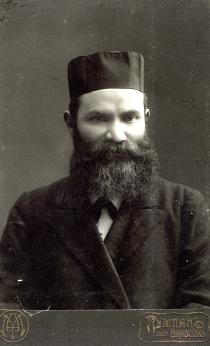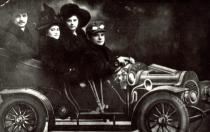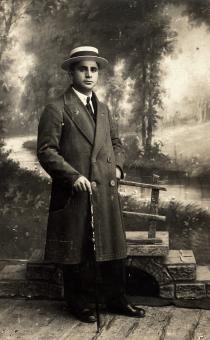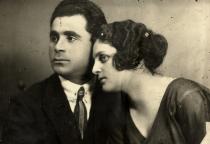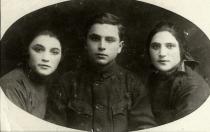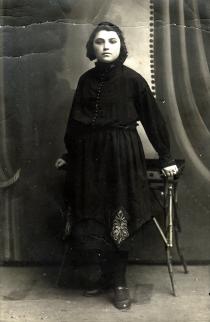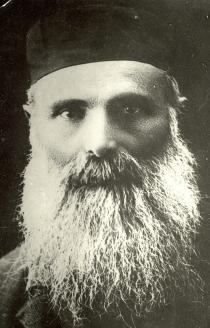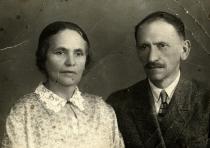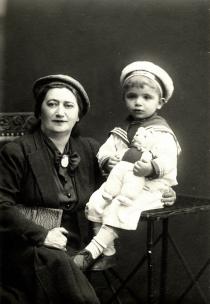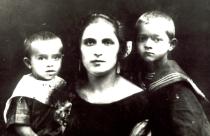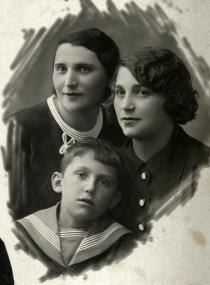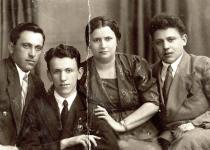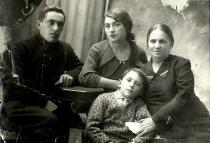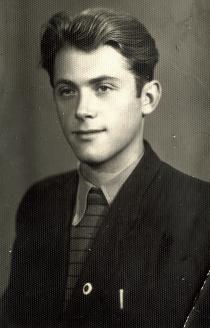
Roman Reznikov
Kiev
Ukraine
Interviewer: Zhanna Litinskaya
Date of interview: May 2002
The name of my great-grandfather, my mother's grandfather, was Wolf Shoov. He lived in Lodz, Poland. He had some kind of commercial business. My grandfather's name was Isaak Shoov and my grandmother's name was Tsylia Shoov. I don't know her maiden name. My grandfather Isaak was born some time around 1860 and my grandmother was born in 1862. They lived in Lodz, Poland. Poland was a part of the Russian empire at that time. A few years before the [Russian] Revolution [of 1917] 1 my grandfather and grandmother's family moved to the town of Gaisin in Vinnitsa region, Ukraine. There was a big Jewish community there at that time. [Editor's note: back then Jews constituted 90% of the population of the city. The Jewish community is still big nowadays, at present nearly 30%, or 6,000 people are Jewish.] I don't know why they moved. Perhaps, it was due to World War I. I know that many Jewish families moved to Russia and Ukraine at that time.
I don't know what my grandfather did for a living in Lodz, but I know that he had a big shop in Gaisin. He sold kitchen and household utilities, tools, spades, pitchforks, etc. One could buy anything one needed in his store. The shop was on the ground floor of my grandfather's house. My grandfather's family lived on the upper floor. I remember that it was a big brick house with an iron roof, which could be afforded by rather rich families at that time. There were five or six rooms in the house. I remember the room where my mother and I were staying when we visited my grandfather. It was a big room with good old furniture. I remember candles in the antique silver candle stands, pictures and a sofa with soft pillows in velvet pillow cases. There was little light in the room. My grandfather's house looked very different to me. My mother, my father and I lived very modestly in Astrakhan, and what I saw in my grandfather's house seemed luxury to me.
As my mother told me, my grandfather Isaak and my grandmother Tsylia were very religious. My grandfather started each day by praying in the local synagogue. When I was visiting my grandfather in the 1930s the synagogue wasn't there any more, but I remember my grandfather putting on his tallit and attaching small boxes with small rolls of paper with prayers to his hand and forehead [tefillin] to pray every day. I didn't know my grandmother Tsylia. She died in 1927 before I was born.
My mother told me that they had a real Jewish home. They celebrated Sabbath, all Jewish holidays and memorable days. They followed the kashrut in the house and had different dishes for dairy and meat products. They took special and very expensive dishes before Pesach from the attic, bought matzah in the synagogue and celebrated Pesach following all necessary requirements. My grandfather Isaak was sitting at the head of the table to lead the festive seder, and read the prayer. My mother also told me that my grandparents fasted at Yom Kippur. My mother and the other children didn't have to fast until they became adults. My mother told me that there was a rabbi in Gaisin, but people were still coming to my grandfather to ask his advice. He was a very wise and considerate man. I guess he had the Talmud at home but I'm not a hundred per cent sure about it.
Their family was rather well-to-do, but my grandparents' children went to work anyway when they were still young. They had eleven children including my mother. All their children were born in Lodz, Poland, and not all of them moved to Gaisin. Two girls - I don't know their names - died when they were still young. During the Revolution and the Civil War 2 the family lived through several pogroms 3. I don't quite know the details of the life of the family during that period, but my mother told me that actually all children tried to leave Gaisin running away from the pogroms.
Moisey Shoov, born in 1895, was my mother's oldest brother. I don't know what Moisey did for a living. I guess he was a worker. After the Revolution he lived in Moscow with his wife and daughter Nyusia. Nyusia was a very beautiful girl. It happened so that my mother's younger brother Shoil, born in 1915, fell in love with her. Of course, the family was against their marriage for the reason that Shoil was Nyusia's uncle. But the young people insisted on getting married which they did. Their marriage didn't last long - Nyusia died when giving birth to her first baby. It was a boy and they gave him the name of Gennadiy. Her father Moisey Shoov couldn't get over his daughter's death and died soon after her, around 1937.
Shoil, my mother's younger brother, never married again. He was raising his son. He worked at the Likhachov Automobile Plant in Moscow. At first he was an apprentice to a mechanic and gradually rose to the post of director of the technical school at this plant. During the Great Patriotic War 4 he was at the front and had medals and orders for his combat deeds. Around 1940, when Jewish people were persecuted [during the so-called Great Terror] 5 he was arrested and sentenced to ten years of imprisonment. He spent seven years in a camp near Karaganda [see Gulag] 6. He returned in 1953 after Stalin died. Shoil was rehabilitated [see Rehabilitation in the Soviet Union] 7. The authorities returned his party membership card and all his awards. Those years in the camps must have been so horrific that he never told me or his son Gennadiy anything about this period of his life. In the late 1970s Shoil emigrated to America and died there in 1998. His son Gennadiy lives in Moscow. He is my only cousin and we are very close.
The next child after Moisey was my mother's brother Boris Shoov, born in 1897. Boris also moved to Moscow after the Civil War. He was very ill with tuberculosis. In Moscow he worked as an accountant assistant in some shop. He had a wife, Emilia, and two children: his son Efim and his daughter Irina. They lived a very modest if not poor life. During the war he and his family were in evacuation. He died of tuberculosis around 1947 in Moscow. His wife Emilia was a cashier in a cinema theater. She died in the early 1990s. His children Efim and Irina emigrated. Efim lives in America and Irina lives in Israel.
The next children in the family were my mother's sister Polya, born in 1898 and her brother Iol, born in 1899. When their parents left Lodz, Polya and Iol refused to go with them for some reason. Before World War II they moved to Australia and then to Israel. Polya was married but I don't know her husband's name. I know that neither she nor Iol had any children. Polya died in 1956 and Iol died in 1960 in Israel.
I have vivid memories of my mother's sister Mina, born in 1900. Mina lived in Astrakhan. Her husband Isaak Belenkiy was a photographer. Mina had no education and she worked as a cleaning lady, then as a janitor and later as a deactivation assistant. Mina and Isaak had two sons: Leonid and Semyon. They were both recruited to the army in the first days of the war and perished at the very beginning of the war. Mina and Isaak were evacuated to Miass, Cheliabinsk region, during the war. The Moscow plant was evacuated there. Mina died in this town in 1951, Isaak stayed to live in ?iass, and died there in the 1960s. They lived in this town with my mother's younger sister Rieva.
Rieva, born in 1910, was married to Boris Rabinovich. He worked as a car tester at a plant. He wasn't recruited to the army and he moved to Miass along with his family. Mina, Rieva and their families stayed in Miass after the war. Rieva died in 1952. She had no children.
My mother's brother Israel Shoov, born in 1908, lived and worked in Moscow. He studied at the Institute of Light Industry and was a recognized specialist in leather goods production. During the war he was in evacuation and later he worked at the research institute and lectured at the Institute of Light Industry in Moscow. He was married to a very beautiful woman. Her name was Shura. She was a well-known pianist and wanted no children for the sake of her career. Israel died in 1976.
My mother Anna Shoov - her Jewish name was Hanna - was born in Lodz on 7th September 1907. She finished five years of the Jewish school in Gaisin. It was an ordinary elementary school. My mother didn't continue her studies during the Revolution. It was a hard time. She didn't tell me much about this period in her life. She preferred to forget hardships. I only remember from what she told me that she and her sisters were running away from pogroms from one town to another. After the Civil War her brother Moisey moved to Moscow. After he settled down the rest of them moved there, too: Israel, Boris, Shoil and Rieva. I don't know whether they were following Jewish traditions when they lived in Moscow. I don't think they were. It wasn't quite safe and not popular. Only Mina and her husband went to Astrakhan. My mother stayed in Gaisin with her parents. Somebody had to look after the house and help my grandmother with the housework. My mother married my father Grigoriy Reznik in 1927.
My father was born on 28th December 1905 in the town of Dashev, Vinnitsa region. When my father was in hospital during the war somebody happened to add two letters to his last name and that was how he became Reznikov. I have his last name, too. My grandfather Moisey Reznik, born in 1878, went to a wedding party in Dashev once. He saw my grandmother Maria Scherbo, born in 1881, at this party. She was 14 and my grandfather was 17 years old. Following the Jewish tradition they got engaged. They got married in four years' time and lived in the house of Avrum Scherbo, my grandmother's father, in Dashev. Avrum was a well-to-do merchant. Moisey became his assistant. It was rather common in Jewish families to accept a son-in-law into a family and help him to start his own business. However, my grandfather Moisey Reznik was very nervous about being dependent on his father-in-law. After he earned some money he and Maria rented a part of the house to live their own life there.
Moisey's parents Nuhim and Reizl Reznik were poorer than my grandmother's parents. They lived in a small house in the woods in the vicinity of Vinnitsa. Nuhim was an accountant assistant and worked for a timber manufacturer. My grandfather Moisey had three sisters: Hontia, Sheva and Feiga. Although my grandfather's family wasn't rich, they managed to give their children a good education. Thus, Moisey knew Hebrew, could read the Torah and the Talmud. His sisters got general and musical education. They could play various instruments and were good at music. Moisey's family was very religious: they observed all Jewish traditions and laws, followed the kashrut, celebrated Sabbath and all religious holidays. My grandfather's family had a very tragic history. In 1928, during the Soviet regime, some bandits with weapons broke into their house and killed everybody there. They killed my great-grandfather Nuhim Reznik, my great-grandmother Reizl, Hontia and Feiga and my grandfather's younger brother Tsyunia. Only my grandfather Moisey and his sister Sheva, who both lived in Kiev at the time, survived. The loss of his parents and sisters was always an open wound for my grandfather. He couldn't bear the thought that he had been away and couldn't protect his loved ones. In those years my grandparents' family lived in a Jewish collective farm 8 near Nikopol. My grandfather and grandmother moved to this collective farm, giving up their business in Gaisin to be able to give education to their younger children, Boris and Emil. The reason was that only children of workers and peasants could study at school. The authorities were reluctant to accept children of richer parents, that is merchants or bourgeois, to Soviet schools.
My grandmother Maria's family was more secular. Theirs was a rich house and they always had guests. It was always very noisy and there was music - they had a record player and records. My grandmother used to take her children to her father's house quite often and my grandfather Moisey didn't quite like it. In 1910 he moved his family to the town of Gaisin and started his own business. He had a partner and they bought a mill to grind grain and sell their products. His business was a success and they could even afford to buy a small house.
There were five children in the family. Anna, born in 1900, was the oldest. She finished a secondary school and entered Odessa Medical Institute. She had to give it up in 1920 since traveling became too dangerous because of all kinds of bandits around. She met a commanding officer in the Red army. He was a Jew. His name was Pavel Shoihet and she married him. Later they lived in Kiev. Pavel was the director of the biggest knitwear factory in Ukraine. They evacuated to Chimkent where Pavel was the manager of big light industry enterprises. After the war they returned to Kiev. Anna died at the age of 95. Her daughter Marina lives in Kiev.
My father's brother Israel, or Srul, was born around 1902. He had a tragic life. Srul was a very gifted boy. He went to school before Anna and finished the whole course in one year. In 1918, during a pogrom, when bandits broke into the house Srul stood up to protect his father Moisey. He was severely wounded and died after two or three days in hospital.
My father's brother Boris Reznik was born in 1910. After the Revolution Boris worked at a construction site and then he got a job assignment from the Komsomol 9 authorities in some commercial business. Before the war he was the director of a big store in Kiev. He was recruited to the army in the first days of the war. He was wounded and was awarded medals and orders. He finished the war in Austria. He returned to Kiev to join his wife Sonia and his daughter Mara. The war impacted Boris' character dramatically. He used to be a sociable man before the war, but after the war he became nervous and irritable. Boris died in Kiev in 1972.
My father's youngest brother Emil Reznik was born in 1916. After technical school Emil entered the Kiev Institute of Light Industry. During the war Emil was in the army and his service was on the border where he stayed for a long time. His family didn't hear from him for quite a while and they thought he was gone. But he happened to come out of the encirclement and afterwards he continued to serve in the army for a long time. Later he became a teacher at the tank school in Chimkent. After the war he lectured at the Kiev tank school. He died in 2000.
Jewish families always support one another. Older people always help younger ones and the younger support their aging parents. It was the same in our family. When it was time for Boris and Emil to go to school, their parents couldn't manage it and their older sister Anna took them into her family. Pavel Shoihet, her husband, was a well-known man in Kiev and he made good money and could afford to support his relatives. The family of Anna and Pavel led a secular way of life. Like many others of their generation they weren't religious and didn't observe any Jewish traditions. The children weren't raised religiously. However, this family helped them to get education and gave them a start-up in life. My grandfather and grandmother moved in with him later as well. My grandfather Moisey died in 1938 and my grandmother Maria came to live with us in Astrakhan.
My parents got married in 1927. They had a real Jewish wedding with a chuppah and all other Jewish traditions. Men were sitting at the tables that were laid specifically for them. There was wine from Moldova and a lot of delicious food. My mother told me that there were many guests and they invited rabbis from the surrounding towns. The women were sitting separately. There were many children and everybody enjoyed the celebration. Shortly after their wedding my mother's mother Tsylia Shoov died. My mother's sister Mina, who lived in Astrakhan then, invited my mother and father to come and live with her and promised to support them. My father went to Astrakhan and began to learn photography from Mina's husband. My mother joined him there shortly afterwards.
I was born on 18th November 1929 in Astrakhan. My father was already working at the photo shop at this time. He liked his job but he wasn't paid well. My mother had to take on all kinds of work to support the family. She worked as a deactivation assistant with Mina for some time, and then she worked as a cashier at the cinema. Some time before the war she learned to saw and got a job at a tailor's shop.
We rented a big 36 square meter room from a dentist. I have vivid memories of this room as far as the dentist's office was in the same building. We had only few pieces of furniture. That was why my grandparents' house in Gaisin seemed so grand to me.
My mother and father went to work and I stayed home alone. I went to the yard. There were many other children of various nationalities - Russian, Jewish, Tatar and Ukrainian. We were all friends. We were all Soviet children and never discussed any issues related to the origin of people. We didn't even know the word 'zhyd' [kike]. There was often a mother that stayed at home on this or that day and she invited all children to have a bite to eat. So did my mother when she had a day off.
The Jewish community in Astrakhan was small. However, there was a synagogue, and my parents went there on holidays. I can't say that our family was particularly religious, but my mother tried not to forget the Jewish holidays and traditions. There was always matzah at home at Pesach and we had guests: Aunt Mina and her husband and sons. But that was all about the Jewish way of life in our family. My parents went to work on Saturday, as this was an ordinary working day in the country. My mother was a religious woman. She observed the fasting at Yom Kippur until her last days. But at that time, in the 1930s, my parents were real Soviet people. They were interested in everything that was happening in the country: the five-year plans 10, collective farms and the Soviet holidays. I was growing up with these Soviet ideas like many others.
I started school in 1937. This was an ordinary school. There were children of many nationalities. Since my childhood history has been my biggest interest. I read a lot. I wasn't very good at mathematics or physics. I borrowed books from the library and often read at night. My mother told me off for doing so - she thought it was bad for my eyes. But I loved reading and it was my hobby. I also liked sports and went in for track and field athletics.
I remember some tension in the middle of the 1930s [during the Great Terror]. My parents stopped celebrating Jewish holidays or going to the synagogue. They seemed to be afraid of something but they never mentioned anything to me. In 1936 our landlord's husband was arrested in Rostov. He was a manager in the fish farming industry. I remember our landlord bringing his little daughter to his house. My mother felt very sorry for the child. She used to tell me that she was an orphan and I had to be very kind and sympathetic with her. Later my mother told me that her father had been shot and her mother arrested and sent to a prison camp. That's the only thing I know about Stalin's repression of people in the 1930s.
My life was smooth and without shadows. I became a Young Octobrist 11 and then a pioneer. I went to parades on 1st May and 7th November [October Revolution Day] 12 with my parents. My grandmother Maria arrived in 1939. We all got along very well in the family. My parents were at work and my grandmother was taking care of the household. She often told me about when she was young, about my grandfather and their town, but frankly speaking, I had little interest in what she told me back then. I was eager to go out: to school, the library or to the stadium. Football was very popular then and I was very fond of it like many other boys.
I don't remember any discussions about the forthcoming war either at school or at home. My parents must have discussed Hitler's rise to power and the beginning of the war in Europe, but they never discussed such serious subjects in my presence. Therefore, the war came as a complete surprise to me. I remember hearing about the war when I was standing in line to buy some bread or cereal. At that time the situation with food products was aggravating. I don't even remember any fear. The war was an abstract notion for me. I was curious about what was going to happen next. Our relatives from Kiev - Aunt Anna and Marina, Uncle Boris' wife and her daughter Mara, Uncle Emil's wife and my grandmother's sister Fania and her son - arrived at our place for evacuation during the war. We all lived in one room. Although there wasn't enough space for all of us, we could manage all right and treated each other nicely. The situation with food products became very bad. I had to stand in line for hours to buy some food. I matured at once somehow. The war didn't show its frightening character yet, but it was clear that there was to be nothing good or 'interesting' about it.
In October 1941 Pavel Shoihet, Aunt Ania's husband, arrived. He was involved in the evacuation of enterprises from Ukraine to Middle Asia. He wanted to take Aunt Anna and Marina to Chimkent where his factory was evacuated. But Anna refused firmly to leave her close ones. Therefore, all relatives from Kiev, including my grandmother Maria, went there.
At the end of 1941 my father was recruited into the army. I remember us seeing him off at the harbor - they left on the Volga River. My father got to the training unit at first and then he went to the artillery unit to serve there. In 1942 the Germans approached Astrakhan and people were running away from them. It was impossible to travel by train - they were already bombing the railroad. We were sailing on the Volga on a barge. It was very frightening. There was a layer of burning oil on the Volga and the river was on fire. We reached Guriev and went by train from there. We went as far as Orys station where we had to change trains. There were crowds of people there, children crying - it was a nightmare. Whenever a train arrived everybody ran towards it pushing everybody else around. It was impossible for the two of us to take a train. Mum and I had to separate. She stayed at this station with our luggage and I took a freight train. I was a quick-moving boy of 12. I got to Chimkent. Pavel sent some transportation to pick up Mamma at the station and she caught up with us.
In Chimkent we lived with the family of Anna and Pavel. They lived in a small house near the stocking factory. Pavel was the director of this factory. I went to school and became a Komsomol member in 1942. I hadn't reached the age of 14 then, and one could only become a Komsomol member beginning from this age, but I convinced the Komsomol unit secretary to let me join the Komsomol. I believed that only being a Komsomol member I would be able to help the front, our country and work for the victory. During the first summer we were sent to harvest cotton. We lived in tents in the steppe. There were local people and those that were evacuated here. Again, nobody discussed any nationality issues. We were all equal. All the boys, including myself, were dreaming of going to the front. However, I realized that I was responsible for the family and was the only man and had to take care of my mother. I was growing up.
For some time the contact with my father was lost. Then he wrote from a hospital. It turned out that he was near Stalingrad, where he had been wounded, and then he arrived in Chimkent. When he arrived I hardly recognized him. He was exhausted, starved and dirty. My mother gave him something to eat. He was hungry but he was afraid that we, kids, would notice it. His hands were trembling and he was crying. I couldn't bear it and ran out of the room. Then my father washed himself and changed into clean clothes and only then I realized that it was my dear Daddy.
The medical commission in Chimkent confirmed that my father wasn't fit to continue his service in the army and he was sent to a labor front in the town of Makat, Guriev region of Kazakh SSR. My mother and I went there, too. I finished the 8th grade in Makat and then I studied one year in Guriev. Then I went to Astrakhan as there was no place to study in Guriev. I finished school in Astrakhan. I lived with my Aunt Mina. My parents lived in Makat until 1946 as my father couldn't leave his labor front assignment.
My parents went to Kiev in 1946. I joined them shortly afterwards. We lived with my father's brother Emil until we received a room on Chkalov Street. It was a room in a communal apartment 13. Five other families lived there. All neighbors got along well, although there were people of various nationalities there. Evacuated families returned to Kiev. Many of them had lost their loved ones. Some of them never returned from the war, some were killed by fascists on occupied territory. There was the Babi Yar 14 in Kiev where thousands of Jews were exterminated. My grandfather Isaak Shoov, my mother's father, was buried alive along with other Jews in Gaisin. My mother heard about it at the beginning of the war. After we returned from evacuation she and my father went to take a look at the horrible place where my grandfather perished. Today there is a monument in Gaisin to honor the memory of the Jewish people that were killed there.
My father got a job as a photographer. My mother worked at the tailor's shop. Life became a routine and I was eager to continue my studies. I submitted my documents to the Law Department of Kiev University in 1948. Of course, it was almost impossible for a Jew to enter university. What helped me was that I was a good athlete and this was a point in my favor. Higher educational institutions took a course of strengthening their sports base. I was told that my task was to not get a '2', the lowest grade in the 5 grade system. I succeeded in that. But instead of the Law Department I was admitted to the Philosophy Department.
There were two other Jews in my group. Our lecturers treated us well until the middle of the 1950s when the campaign against cosmopolitans 15 began. These events didn't impact me but two or three university students were expelled and repressed during this period. I remember them arresting Lena Reznik - this girl had the same last name as I did - and a guy called Boiko. They were both sentenced on the basis of Article 58 [treason] and were released after Stalin died in 1953.
There was trouble in our family, too. My father wasn't a good photographer, just a lab assistant. He quit photography in 1950 and got a job as a vendor at the railway station. He didn't even work half a year there. The other shift man there was a Ukrainian. And they played a trick with my father making up a cash shortage of 6,000 rubles. He was arrested and sentenced to ten years of imprisonment for theft. He was sent to the Volga-Don channel construction site. Life and work conditions there were terrible. Life there was like it was in the most horrible Stalin camps. During all these years I addressed the authorities to review my father's case. I even had a meeting with the general prosecutor in Moscow. But only in 1957 my father's case was changed to the sentence 'negligence' changing the term of his imprisonment to two years. By that time my father had already been imprisoned for seven years. When he returned he looked even more awful than he did after he returned from Stalingrad in 1942. My father hardly ever spoke about his life in the camp - these memories were unbearable for him. After he returned my father went to work as a photographer again. He died in Kiev in 1988. My mother lived twelve years longer and died in 2000. During all these years my mother was living with me. She was my closest and dearest one.
I graduated from university in 1953. My specialty was the history of philosophy. I was sent to Zhytomyr. There I had an interview at the regional party committee. My profession was related to ideology and I wasn't a party member. I was a Komsomol member and I had to obtain approval of the regional party committee to get a job. For the first time there I heard how they were discussing my documents behind closed doors. The head of the propaganda department was yelling how it was possible to approve a Jew for this kind of work. I couldn't get a job for a few weeks and then finally I was appointed as a lecturer with the Znaniye [Knowledge] association. [Editor's note: an organization that was arranging lectures on various subjects at schools, factories, enterprises, etc.] I was to give lectures to workers advocating communism and the Soviet way of life, the most progressive in the world. I lived in Zhytomyr for four years. I was an active Komsomol member. I was even elected as a member of the Komsomol district committee bureau. I submitted my documents to become a party member but I was refused for some ridiculous reasons. There was only one real reason - that I was a Jew.
I returned to Kiev in 1957. It was impossible for a Jew to find a job in his qualified field. Frankly speaking, I didn't even try. I was a good sportsman; I was good at track and field sports. I got a job as a PE instructor at a technical construction school. Then I finished the trade union high school - I was an extramural student - and became trade union unit chairman. At this time I easily became a party member. I worked as a sociologist with the Poligraphbook association for several years before I retired. Then I organized and acted as the director of the Radyanskiy district charity fund called Renaissance. We provided assistance to needy families, elderly people and families with many children. To get the funds I addressed different authorities, private companies and businessmen. I wrote letters abroad requesting help and received assistance from the Jewish communities in Boston, Philadelphia, USA. Our fund provided assistance to all people regardless of their nationality. The Renaissance Fund existed for ten years. I can't work any more; I'm retired and receive my pension.
I've been married twice. I got married before my graduation from university in 1953. My first wife was a Jew, Ida Leonidovna Bloomstein, and she was an engineer. We lived together for 17 yeas but our marriage didn't work out. I don't want to recall her or speak about her. We got divorced. She lives in Chicago now.
Our son Vladimir Reznikov was born in 1961. He finished dentistry school. He worked as a dentist assistant. He served in the army. After he returned from the army he got married and moved to the USA in 1988. He worked at a restaurant there and then as a cab driver and studied at the same time. He first studied at Chicago Medical University and then as a post-graduate student. He has his own practice now and he is a successful psychoanalyst. His son Alexandr was born in Chicago. He is 17 now and is finishing a college.
My second wife is Russian. Her name is Olympiada Romanovna Gapon. She worked as a surgeon in a town hospital. She is also a pensioner now. We have no children. My wife comes from Odessa. She has many Jewish friends and we have no difference of opinion when it comes to nationality issues. We've visited my friends in Israel. We've even discussed the issue of emigration to Israel. If I decided to move there she would go with me. But I have always considered myself a Soviet citizen and could never imagine living away from my motherland - Kiev, Ukraine. However I've always taken big interest in the Jewish State. But my motherland is here and I want to be here until my last day.
While my mother was alive we celebrated all Jewish holidays - we were doing this for the sake of my Mum. We stopped doing it after she died. I often visit the Jewish center Hesed. I'm a member of the Jewish cultural society and read Jewish newspapers. The situation in Israel is a big concern of mine. I feel close to the Jewish country and wish its people victory and peace. But I can and want to live my life here.
Glossary
